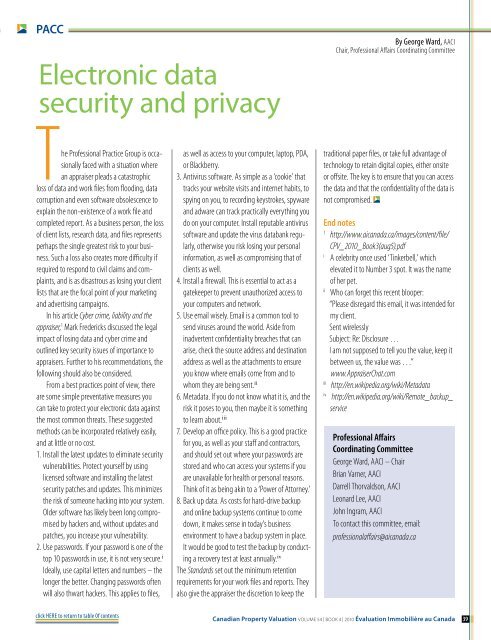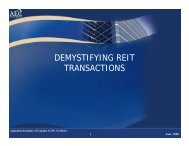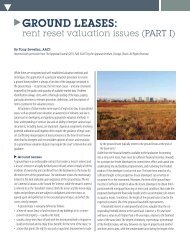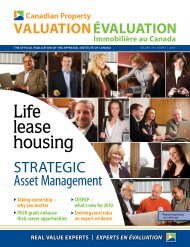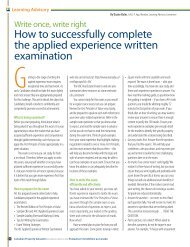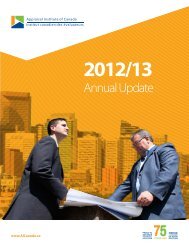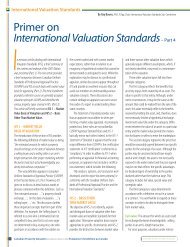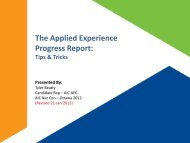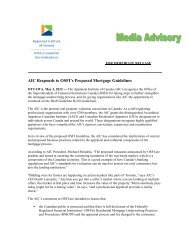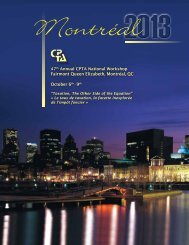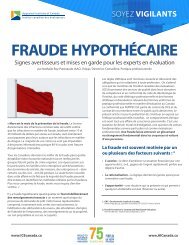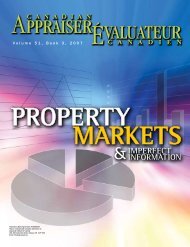InvestigatingSay what you meanand mean what you sayIcannot remember when I first heard thatsaying, but suspect it was from my parentsmany years ago. Then, as a 25-year member <strong>of</strong>the RCMP, I was reminded <strong>of</strong> its importance countlesstimes when conducting investigations and/orgiving evidence. While no longer conducting criminalinvestigations, I find this timeless piece <strong>of</strong> adviceinvaluable in everyday life – and never more evidentthan over the past couple <strong>of</strong> years being an investigatorwith the AIC.My intent is not to speak to the importance <strong>of</strong>good grammar – although we all know this is veryimportant as well – it is to comment on the importance<strong>of</strong> being accurate in what we say, to guardagainst the natural human tendency <strong>of</strong> wanting tomake sense <strong>of</strong> things we see, or to form opinionson limited knowledge or data. People rely on ourreports to be accurate and, if we make statementsthat are later found to be untrue or misrepresent thetruth, our reputation may be devalued – not to mentionour possibly being liable. Think <strong>of</strong> it this way, thewords/phrases you use can have different meanings,i.e., 1) what you mean, 2) what the reader/listenerthinks you mean, and 3) the dictionary definition.In reviewing files, and in everyday life experiences,I find that misunderstandings generally stemfrom two broad areas <strong>of</strong> communication style. Thefirst is making generalized statements without qualifications,i.e., what is ‘old’ and what is ‘young?’ Well,you may be 30 and think 50 is old and 25 is young.What about the 50-year old – he may feel young– and is, compared to his/her parents. What aboutwhen describing the condition <strong>of</strong> someone’s homeor the strength <strong>of</strong> a market? While I am not suggestingthat we cannot use general words/phrases, I amsuggesting that, without qualifying them, you areincreasing the risk <strong>of</strong> being misunderstood.The second communication style that ismisleading to even yourself is making assumptions.Dictionaries define ‘assumption’ as – an act<strong>of</strong> taking to or upon oneself, taking for granted,something taken for granted or accepted as truewithout pro<strong>of</strong>, a supposition, arrogance, etc. It isthis ‘assuming’ that I earlier referred to as a naturalhuman response to our need to try and make sense<strong>of</strong> things we see and hear. At times, this may lead t<strong>of</strong>orming unsubstantiated opinions. However, if wesimply state what we actually know, and not whatwe think we know, we will subject ourselves to lesscriticism due to these possibly misleading and falseassumptions and reduce the risk <strong>of</strong> coming beforethe PPC process. Here are some examples:Is the basement ‘insulated and boarded,’ or isit, ‘boarded and assumed insulated?’ You saw theboarding, but did you see the insulation?Is the property/home ‘owner-occupied,’ or is itactually ‘assumed owner-occupied?’ Do you personallyknow the people that live there, have you seen the title,etc.? Or, could this be the file where the person you metat the property was an imposter stealing mortgagemoney from the real property owner without yourknowledge?When you are shown an environmentally cleancertificate for the subject property, should you say, “theproperty is environmentally clean,” or should you say,“the client provided an environmental clean certificatefor the property” – with further observational commentsas required?Under property history is a statement such as, “Theproperty was purchased by the current owner in March2008 for $500,000” – correct? Or is it, “The clientadvises that he/she purchased the property in March2008 for $500,000?” Or could it be, “Title indicatesthat the property was purchased in March <strong>of</strong> 2008 for$500,000?” If you were not one <strong>of</strong> the parties in thetransaction, how can you be sure the title is correct orthat the client is telling you the truth? How many timeshave clients been untruthful to you?By Gerry Gehlen, AACIMember, Investigating CommitteeThe point <strong>of</strong> the above examples is not to suggestthat you cannot make assumptions, it is to suggestthe importance <strong>of</strong> disclosing those assumptions so thereader/client/user can make better-informed decisions.While we may agree that we do not know the cause<strong>of</strong> why some members/people make more incorrectassumptions than others, I think it is important torecognize that just about everything we do is habit.While my 25 years as a police <strong>of</strong>ficer may have mademe more skeptical than most, it leads me to seequite <strong>of</strong>ten where our members have made incorrectassumptions that lead to misunderstandings. Repeatingor relying on second- or third-hand information asbeing accurate (without verification) is a notoriouslybad habit. Assuming we are doing good work, there isnothing wrong with stating the simple truth – and ifyou do not know something, then say so. No one getsmore credibility on the stand or at the hearing thanthe person who does good work and does not hesitateto admit they do not know everything. It is nevermore evident than in litigation work that it is not goodenough to do good work, you have to be credible.It does not take any longer to develop a good habitthan a bad one – and forming good habits is a habitin itself. If there is one assumption you should make,it is assuming you will eventually have to defend yourwork/statements – so get it right the first time.Investigating CommitteeDarrell Thorvaldson, AACI – ChairMike Schulkowsky, AACIStan Jugovic, AACIGerry Gehlen, AACIPaul Beckwith, AACIJoe Kireta, AACIDeana Halladay, CRATo contact this committee, email:investigating@aicanada.ca38Canadian Property Valuation Volume 54 | book 4 | 2010 Évaluation Immobilière au <strong>Canada</strong>click here to return to table 0f contents
PACCElectronic datasecurity and privacyThe Pr<strong>of</strong>essional Practice Group is occasionallyfaced with a situation wherean appraiser pleads a catastrophicloss <strong>of</strong> data and work files from flooding, datacorruption and even s<strong>of</strong>tware obsolescence toexplain the non-existence <strong>of</strong> a work file andcompleted report. As a business person, the loss<strong>of</strong> client lists, research data, and files representsperhaps the single greatest risk to your business.Such a loss also creates more difficulty ifrequired to respond to civil claims and complaints,and is as disastrous as losing your clientlists that are the focal point <strong>of</strong> your marketingand advertising campaigns.In his article Cyber crime, liability and theappraiser, 1 Mark Fredericks discussed the legalimpact <strong>of</strong> losing data and cyber crime andoutlined key security issues <strong>of</strong> importance toappraisers. Further to his recommendations, thefollowing should also be considered.From a best practices point <strong>of</strong> view, thereare some simple preventative measures youcan take to protect your electronic data againstthe most common threats. These suggestedmethods can be incorporated relatively easily,and at little or no cost.1. Install the latest updates to eliminate securityvulnerabilities. Protect yourself by usinglicensed s<strong>of</strong>tware and installing the latestsecurity patches and updates. This minimizesthe risk <strong>of</strong> someone hacking into your system.Older s<strong>of</strong>tware has likely been long compromisedby hackers and, without updates andpatches, you increase your vulnerability.2. Use passwords. If your password is one <strong>of</strong> thetop 10 passwords in use, it is not very secure. iIdeally, use capital letters and numbers – thelonger the better. Changing passwords <strong>of</strong>tenwill also thwart hackers. This applies to files,as well as access to your computer, laptop, PDA,or Blackberry.3. Antivirus s<strong>of</strong>tware. As simple as a ‘cookie’ thattracks your website visits and internet habits, tospying on you, to recording keystrokes, spywareand adware can track practically everything youdo on your computer. Install reputable antiviruss<strong>of</strong>tware and update the virus databank regularly,otherwise you risk losing your personalinformation, as well as compromising that <strong>of</strong>clients as well.4. Install a firewall. This is essential to act as agatekeeper to prevent unauthorized access toyour computers and network.5. Use email wisely. Email is a common tool tosend viruses around the world. Aside frominadvertent confidentiality breaches that canarise, check the source address and destinationaddress as well as the attachments to ensureyou know where emails come from and towhom they are being sent. ii6. Metadata. If you do not know what it is, and therisk it poses to you, then maybe it is somethingto learn about. iii7. Develop an <strong>of</strong>fice policy. This is a good practicefor you, as well as your staff and contractors,and should set out where your passwords arestored and who can access your systems if youare unavailable for health or personal reasons.Think <strong>of</strong> it as being akin to a ‘Power <strong>of</strong> Attorney.’8. Back up data. As costs for hard-drive backupand online backup systems continue to comedown, it makes sense in today’s businessenvironment to have a backup system in place.It would be good to test the backup by conductinga recovery test at least annually. ivThe Standards set out the minimum retentionrequirements for your work files and reports. Theyalso give the appraiser the discretion to keep theBy George Ward, AACIChair, Pr<strong>of</strong>essional Affairs Coordinating Committeetraditional paper files, or take full advantage <strong>of</strong>technology to retain digital copies, either onsiteor <strong>of</strong>fsite. The key is to ensure that you can accessthe data and that the confidentiality <strong>of</strong> the data isnot compromised.End notes1http://www.aicanada.ca/images/content/file/CPV_2010_<strong>Book</strong>3(aug5).pdfiA celebrity once used ‘Tinkerbell,’ whichelevated it to Number 3 spot. It was the name<strong>of</strong> her pet.iiWho can forget this recent blooper:“Please disregard this email, it was intended formy client.Sent wirelesslySubject: Re: Disclosure …I am not supposed to tell you the value, keep itbetween us, the value was …”www.AppraiserChat.comiiihttp://en.wikipedia.org/wiki/Metadataivhttp://en.wikipedia.org/wiki/Remote_backup_servicePr<strong>of</strong>essional AffairsCoordinating CommitteeGeorge Ward, AACI – ChairBrian Varner, AACIDarrell Thorvaldson, AACILeonard Lee, AACIJohn Ingram, AACITo contact this committee, email:pr<strong>of</strong>essionalaffairs@aicanada.caclick here to return to table 0f contentsCanadian Property Valuation Volume 54 | book 4 | 2010 Évaluation Immobilière au <strong>Canada</strong> 39


